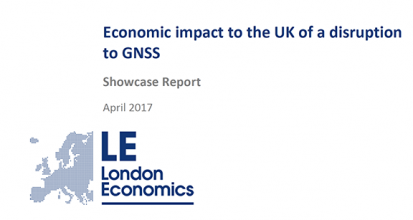With so much of today’s society reliant on GNSS technology, any extended disruption of service could cause quite an uproar. Several of these potential problems are described in great detail in a government report commissioned by Innovate UK along with the UK Space Agency and the Royal Institute of Navigation.
With so much of today’s society reliant on GNSS technology, any extended disruption of service could cause quite an uproar. Several of these potential problems are described in great detail in a government report commissioned by Innovate UK along with the UK Space Agency and the Royal Institute of Navigation.
The showcase report, titled “Economic impact to the UK of a disruption to GNSS”, was released in April by London Economics. The report states that the UK could lose £1 billion per day (about $1.263 billion) if GNSS experienced a major disruption. But such a disruption would cause more than just financial woes, as emergency care and everyday essential activities also would be adversely affected.
As is the case in much of today’s world, there’s so much dependence on the technology for everyday navigation on mobile phones and vehicles, for tracking, and for precise timing. Additionally, a disruption of GNSS service would mean emergency services would not be able to properly handle demand, emergency-related calls would be longer, congestion would be severe, and navigation systems would not function. A lack of GNSS would not only impact navigation, it would affect multiple industries in the UK that rely on the technology for mapping, tracking and timing.
The study aims to provide an answer to what would happen if GNSS were temporarily not available in the UK — in terms of estimated economic impact: comprising lost Gross-Value Added (GVA) and loss of utility benefits, including damages. Note that the impact of a GNSS-reliant present-day UK losing GNSS functionality unexpectedly, is much greater than the incremental benefit to the UK of using GNSS rather than the well-functioning next best alternative to GNSS, according to the report.
Using a combination of desk-based research and a program of more than 35 expert consultations, the report identifies patterns of current usage, the functional role of GNSS within each system, resilience (if any) to disruption, and estimates the likely impact of a disruption to GNSS availability for up to five days across 10 application domains in the UK: road, rail, aviation, maritime, food, emergency and justice services, surveying, location-based services (LBS), other Infrastructure, and other applications. More detailed estimates, and a description of methodology, are presented in the full report.
The report outlines a day in the UK of using the many, many services that operate using GNSS, starting in the morning at home and ending up back at home. The home uses include smartphone alarm clocks using precise time information, GNSS use for tracking a morning run, electricity drawn from the GNSS-synchronized grid, smart home technology linked to GNSS-derived user locations, and GNSS navigation and positioning used for deliveries, just to name a few. In between the morning and evening at-home uses are a whole different realm of daily uses for GNSS, including driving and traveling, work duties, shopping and merchandising, which can be made more efficient and safer by using GNSS technology. Then you have the emergencies, first-responder services and disaster response and search and rescue — all assisted greatly by GNSS.
“Ask an average person on a typical UK street and they’ll probably tell you that GPS is a satellite-based navigation system that they use to work out where they are, and how to get somewhere. But it is so much more than that …” the report says in its introduction.
Because of the tremendous impact a disruption of service would produce, it is difficult to put just a financial figure on the problems that would come about. But the study does address several issues that would result from such a disruption of GNSS, which provides positioning, navigation and timing (PNT) information via satellites orbiting in space. This information allows users with a compatible receiver (e.g. smartphone) to determine their position, velocity and precise universal and local time.
Applications that use GNSS are widespread, but the full extent and nature of use, as well as their resilience to a GNSS outage, has not been well understood, the report said. This gap in knowledge is concerning, as GNSS is subject to various vulnerabilities to failure. Given the coincidence of widespread use (including safety-critical applications) and vulnerability, the researchers felt this study would be of great importance.
Given the highly strategic and economic value of GNSS, the study presents the rationale and a high-level assessment of the impact of UK public funding of GNSS. The cost and effectiveness of possible mitigation strategies are also considered.
The findings are subject to the following high-level limitations and caveats:
• The study is constrained by the availability and accuracy of published information, and user/expert knowledge and assessment of risks. Estimates may contain an optimism bias.
• The report is agnostic to the actual source of the considered disruption.
• The disruption to GNSS is considered as a standalone event.
• The analysis relates to current modern-day UK. However, as GNSS applications are dynamic and reliance changes over time, the validity of the results is time-sensitive.
Current Usage and Benefits of GNSS
GNSS has been described as the invisible utility, and the findings of this research suggest that status to be well justified. GNSS is an integral source of timing and positioning information for a very wide range of economic sectors in the UK, enabling and enhancing daily activities for public, commercial and private citizen users. All critical national infrastructures (CNI) rely on GNSS to some extent, with Communications, Emergency Services, Finance, and Transport identified as particularly intensive users. The reliance on GNSS has developed over decades, based on assumed availability and continuity of GNSS. GNSS is also a primary input for Transport (road, air, maritime, and rail), Agriculture, Surveying, and Legal users.
It has been estimated that the UK Space Industry derived turnover of £1.7 billion (about $2.15 billion) from PNT services in 2014-15, supporting 4,000 jobs. More broadly, sectors generating a total of £206 billion (about $260 billion) in Gross Value Added (11.3% of UK GDP) are supported directly by GNSS, but the primacy of GNSS in critical national infrastructures means that an even wider range of economic activity is underpinned by GNSS indirectly, the study indicates.
However, for emergency and justice services, almost all of the benefits come from the impact on the public-safety answering points (PSAP) – a service which receives emergency calls and provides the GNSS-derived mobile phone location data to the emergency services when available – reducing call and search times. Other notable benefits come from: the time and fuel savings that GNSS-supported navigation enables in the maritime industry; the impact for precision agriculture on increased crop yields and the more efficient application of pesticides and fertilizer, and the monetizability benefits that are associated with GNSS’ contribution to the accuracy of weather forecasting.
It should be noted, however, that these benefits have all been estimated conservatively as the incremental benefit of using GNSS rather than the well-functioning next best alternative, according to the report.
The report follows an incident last year when a problem with GPS satellite timing signal triggered alarms across the continent and caused an unknown number of outages, including the disruption of some features of critical infrastructure.
That software problem threw GPS’s coordinated universal time (UTC) timing message off by 13 microseconds, which affected the timing data on legacy L-band signals and the time provided by GPS timing receivers, Inside GNSS reported at the time.
The UK economic report raises questions as to whether the government should invest in a national backup and what that should be, or if it ought to promote a commercially based backup that government and companies can use as needed. Although questions remain, concerns about a sudden GPS glitch have grabbed the attention of European authorities ever since the problem in January of 2016 noted above, underscoring the need for a backup timing system. This latest study only reiterates just how great an impact a disruption of GNSS would have in the UK.





![Trimble Launches New IonoGuard Technology to Mitigate Costly GNSS Signal Interruptions IonoGuard PR Image[32]](https://insidegnss.com/wp-content/uploads/2023/10/IonoGuard-PR-Image32-150x150.jpg)
